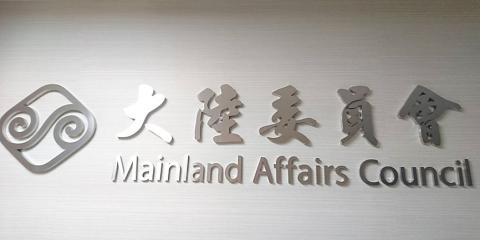Most Taiwanese do not agree with China’s “one country, two systems” formula for unification and believe the nation’s future should be decided by its people, a survey released by the Mainland Affairs Council (MAC) on Thursday showed.
In the survey, which was conducted by National Chengchi University’s Election Study Center from Wednesday to Sunday last week, 79 percent of respondents rejected the “one country, two systems” concept, which would make Taiwan a special administrative region of China.
Only 10.4 percent of respondents accepted the formula, while 10.5 percent said they had no opinion.

Photo: Chung Li-hua, Taipei Times
The government has already taken countermeasures against a five-point proposal announced by Chinese President Xi Jinping (習近平) on Jan. 2, council spokesman Chiu Chui-cheng (邱垂正) said, adding that the results of the survey proved that Taiwanese oppose China’s propaganda and divisiveness.
Meanwhile, 83.9 percent of respondents rejected the use of force by China against Taiwan, while 87.7 percent said that Taiwan’s future and cross-strait relations should be decided by Taiwan’s 23 million people.
The survey also found that 83.9 percent support exchanges between Taiwan and China being undertaken on the basis of equality and mutual respect, without political preconditions and based on the law.
Eight out of 10 respondents said that the government should have better legislative and monitoring mechanisms before engaging in political negotiations or signing agreements with China.
Almost 90 percent of respondents said that the “status quo” across the Taiwan Strait should be maintained.
The telephone survey collected data from 1,093 people aged 20 or above. It has a margin of error of 2.96 percentage points and a confidence level of 95 percent.

A group of Taiwanese-American and Tibetan-American students at Harvard University on Saturday disrupted Chinese Ambassador to the US Xie Feng’s (謝鋒) speech at the school, accusing him of being responsible for numerous human rights violations. Four students — two Taiwanese Americans and two from Tibet — held up banners inside a conference hall where Xie was delivering a speech at the opening ceremony of the Harvard Kennedy School China Conference 2024. In a video clip provided by the Coalition of Students Resisting the CCP (Chinese Communist Party), Taiwanese-American Cosette Wu (吳亭樺) and Tibetan-American Tsering Yangchen are seen holding banners that together read:

UNAWARE: Many people sit for long hours every day and eat unhealthy foods, putting them at greater risk of developing one of the ‘three highs,’ an expert said More than 30 percent of adults aged 40 or older who underwent a government-funded health exam were unaware they had at least one of the “three highs” — high blood pressure, high blood lipids or high blood sugar, the Health Promotion Administration (HPA) said yesterday. Among adults aged 40 or older who said they did not have any of the “three highs” before taking the health exam, more than 30 percent were found to have at least one of them, Adult Preventive Health Examination Service data from 2022 showed. People with long-term medical conditions such as hypertension or diabetes usually do not

Heat advisories were in effect for nine administrative regions yesterday afternoon as warm southwesterly winds pushed temperatures above 38°C in parts of southern Taiwan, the Central Weather Administration (CWA) said. As of 3:30pm yesterday, Tainan’s Yujing District (玉井) had recorded the day’s highest temperature of 39.7°C, though the measurement will not be included in Taiwan’s official heat records since Yujing is an automatic rather than manually operated weather station, the CWA said. Highs recorded in other areas were 38.7°C in Kaohsiung’s Neimen District (內門), 38.2°C in Chiayi City and 38.1°C in Pingtung’s Sandimen Township (三地門), CWA data showed. The spell of scorching

POLICE INVESTIGATING: A man said he quit his job as a nurse at Taipei Tzu Chi Hospital as he had been ‘disgusted’ by the behavior of his colleagues A man yesterday morning wrote online that he had witnessed nurses taking photographs and touching anesthetized patients inappropriately in Taipei Tzu Chi Hospital’s operating theaters. The man surnamed Huang (黃) wrote on the Professional Technology Temple bulletin board that during his six-month stint as a nurse at the hospital, he had seen nurses taking pictures of patients, including of their private parts, after they were anesthetized. Some nurses had also touched patients inappropriately and children were among those photographed, he said. Huang said this “disgusted” him “so much” that “he felt the need to reveal these unethical acts in the operating theater